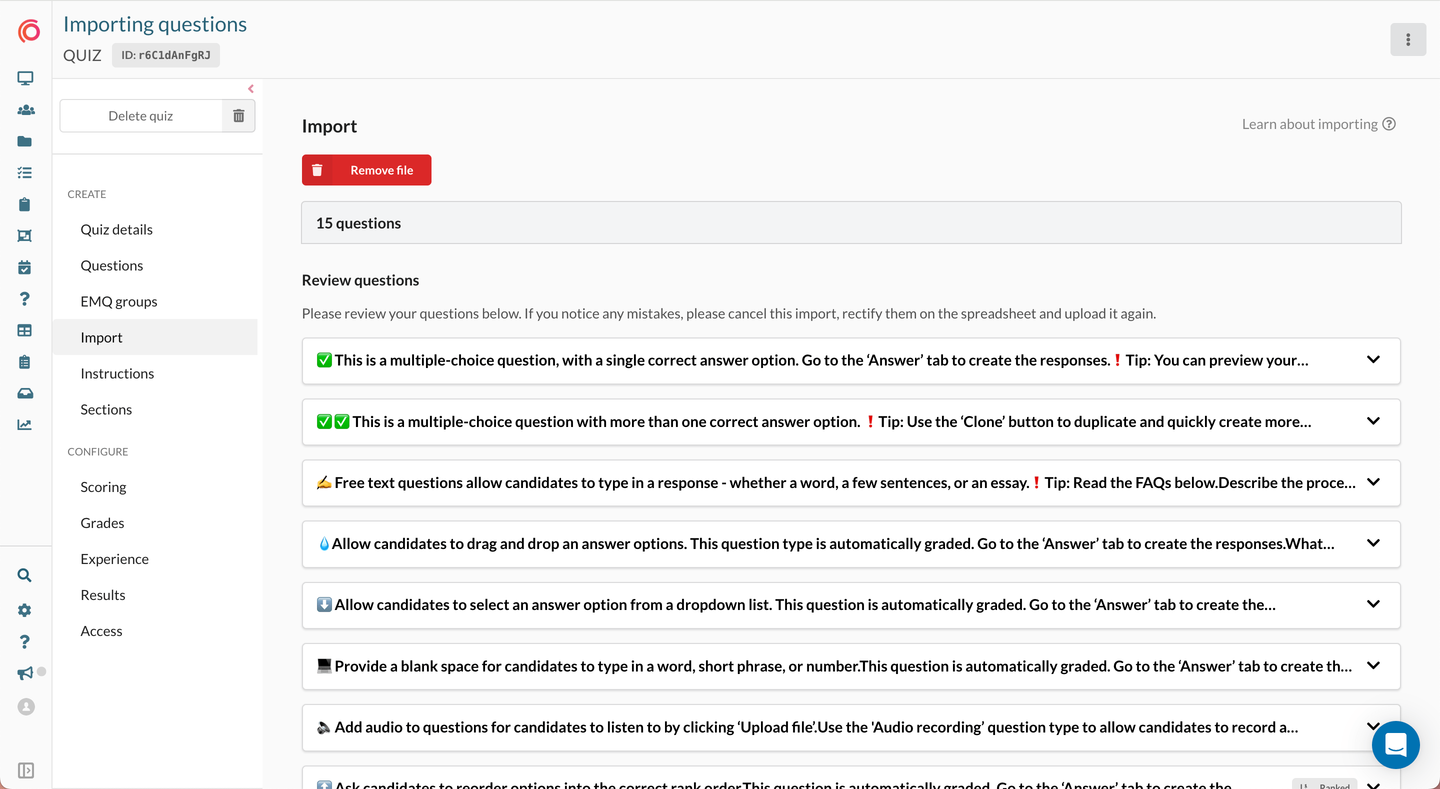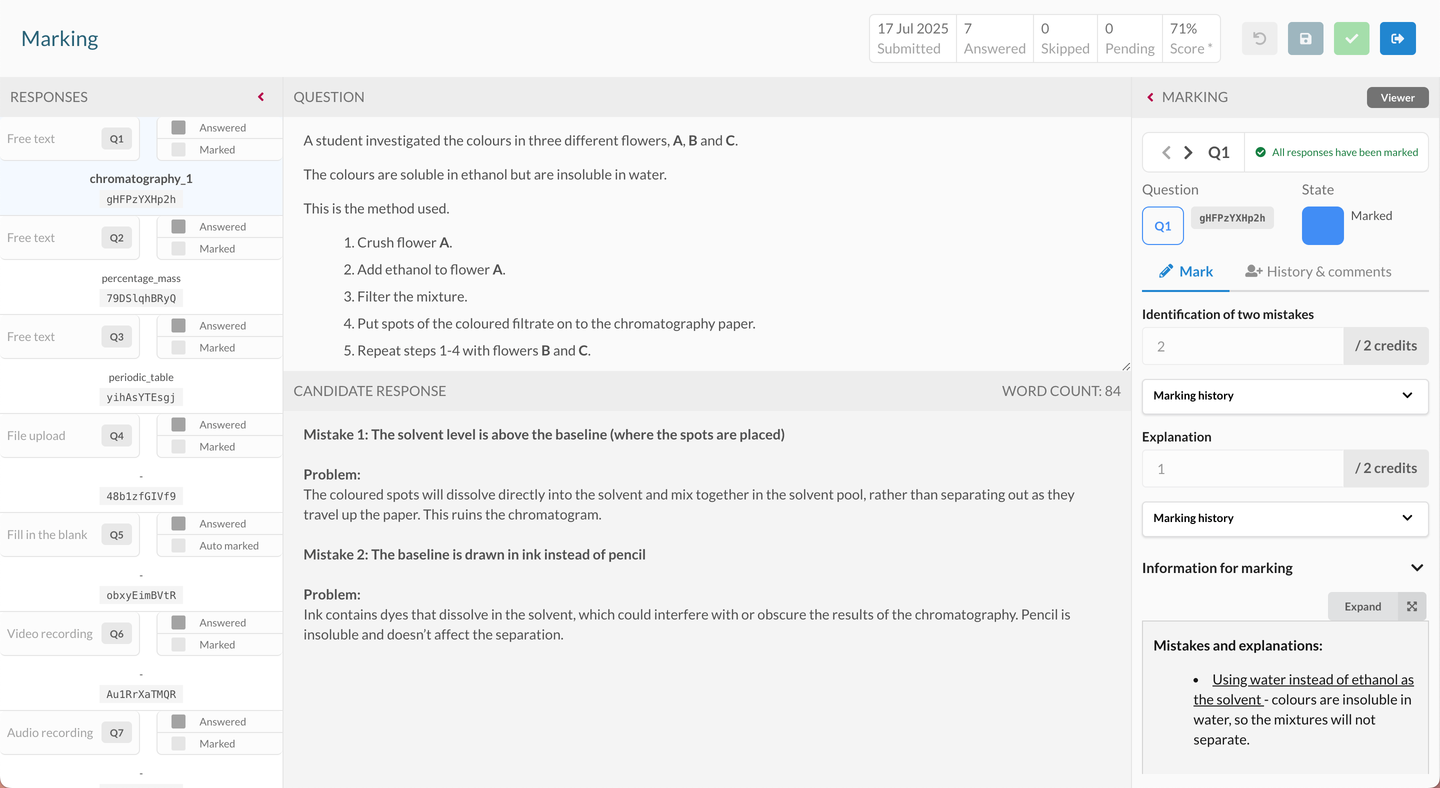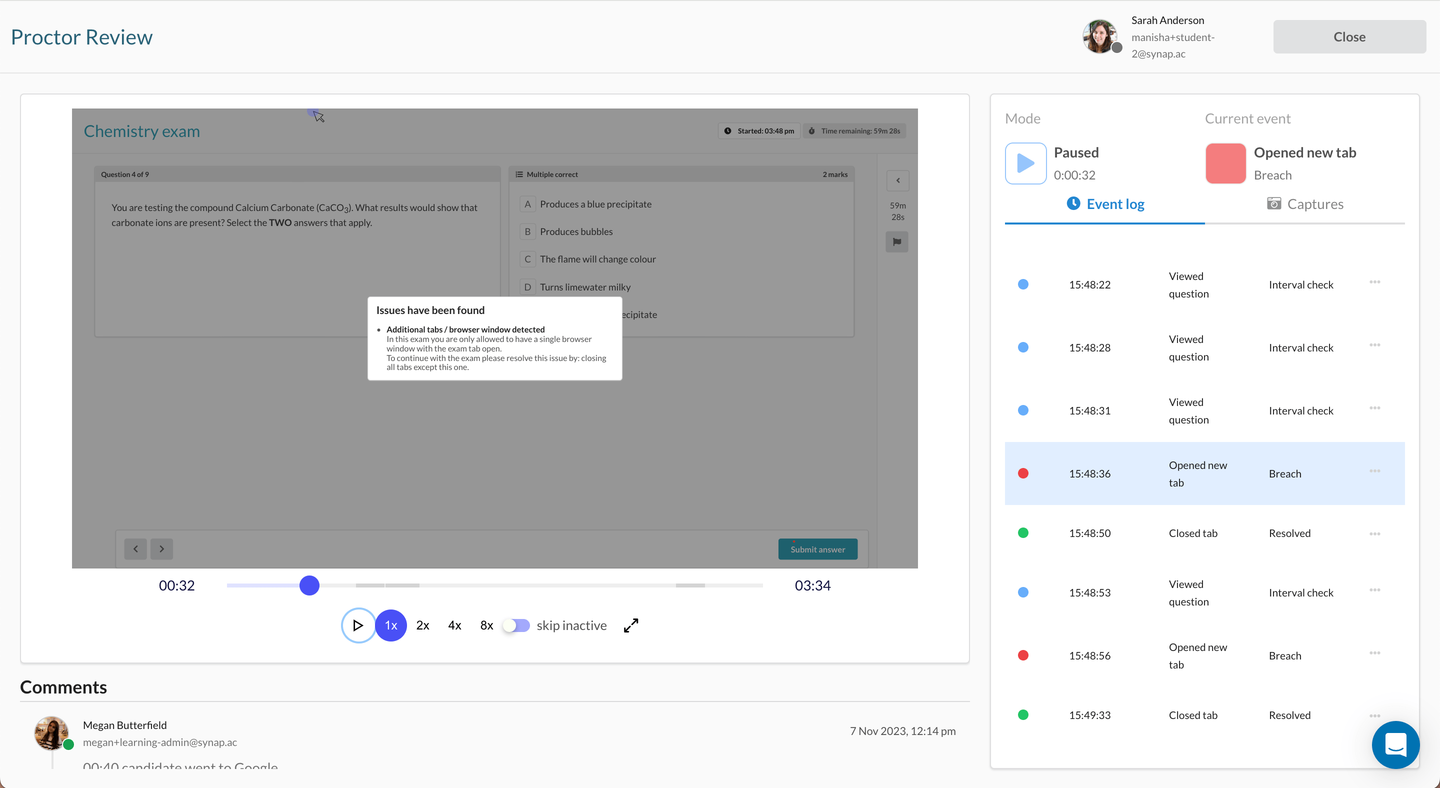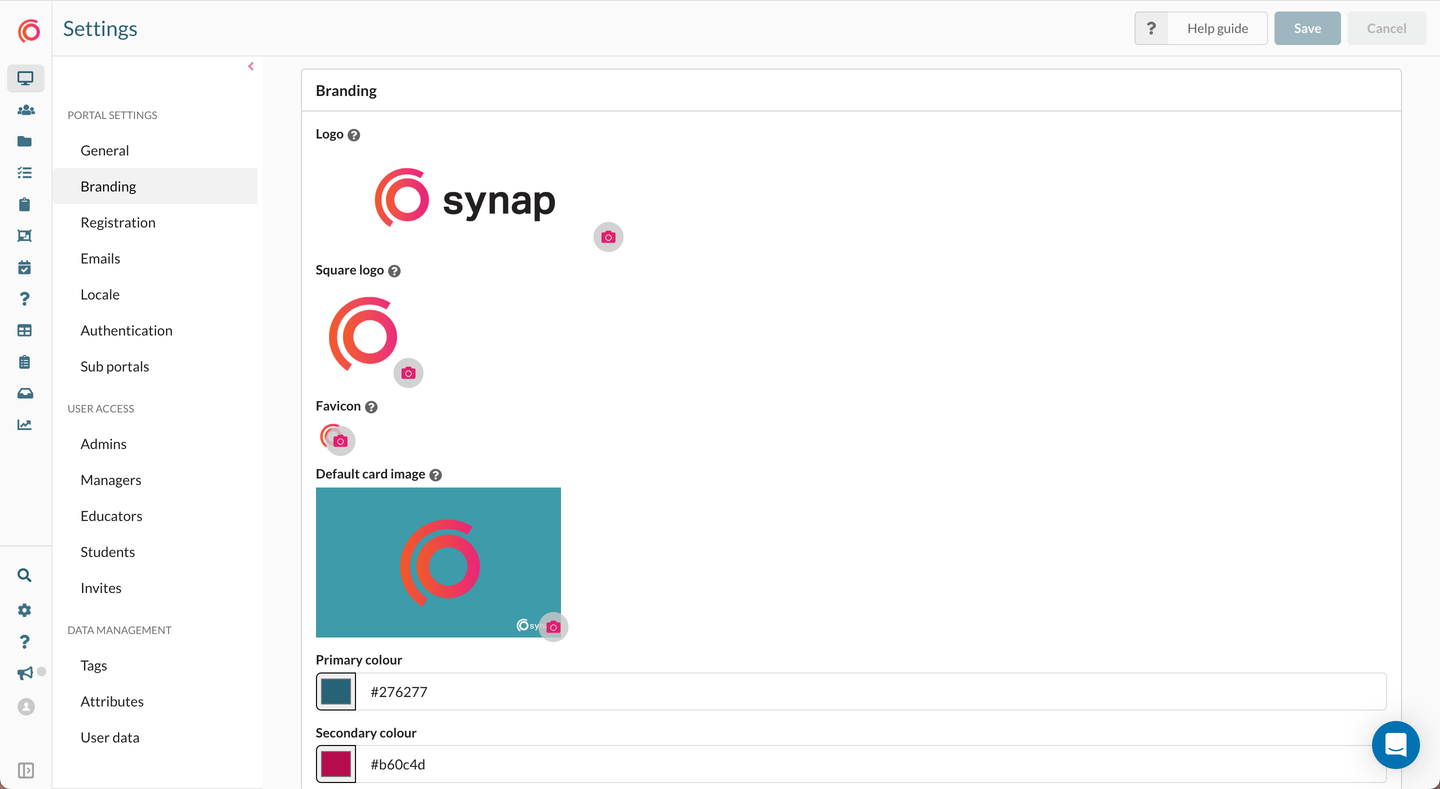It can be hard to know which online exam platform is right for your organisation. Each system comes with different features, pricing models, and limitations. The danger is only discovering gaps after you’ve invested time (and money) in the wrong provider, resulting in having to redesign your exams, retrain staff, or even migrate to a new system altogether. This checklist highlights the** key questions you should ask before you make a decision**, along with why each one is important. Whether you’re running professional certifications, compliance training, or university assessments, this will help you evaluate platforms with confidence.
Uploading questions
- What question types and media are supported? Exams vary widely, so make sure the platform supports the question types you need, whether that’s multiple choice, essays, drag-and-drop, coding challenges, etc. If the platform doesn’t support the formats you need, you’ll be forced to convert them or switch providers later.
- Can I include images, audio, video, or interactive content? The ability to include rich media makes assessments more engaging and realistic. Look for a platform that supports images, audio, video, and interactive elements.
- Can I bulk import/export my questions? Building a question bank takes years to build. If you can’t import existing content or export it later, you risk being locked into the platform. Bulk tools save hours of admin and help protect your investment.

Exam features
- What online exam delivery features are available? Features such as certificates, timed exams, randomised question order, and secure browsers can make or break the exam experience. Missing one at the wrong moment could derail an entire assessment.
- What reporting and performance analytics are included? Good platforms provide deep insights into learner performance, question difficulty, and engagement. Detailed analytics allow you to identify trends, refine questions, and improve your assessments over time.
- Do you offer exam grading options and feedback tools? Look for flexible marking options: automated grading for objective questions and manual marking for subjective answers. The ability to leave comments, add marking rubrics, or assign partial marks ensures learners get richer, more constructive feedback.

Anti-cheat/security
- Do you have anti-cheat and proctoring options? Security features like online exam proctoring, browser lockdown, and identity verification help maintain exam integrity. Whether delivering exams remotely or in person, these measures are essential for high-stakes assessments.

Data security and privacy
- Who owns the questions and data on the platform? This is one of the most overlooked, yet critical, questions. Some providers claim ownership of your question bank, meaning years of intellectual property could effectively belong to them. Always ensure you retain full ownership and control of your IP.
- Does the platform meet data security standards? With GDPR and other regulations, mishandling learner data isn’t just bad practice, it can lead to legal and compliance risks. Make sure the platform complies with relevant security and data protection standards for your region.
Accessibility
- Is the platform accessible for all users? Ensuring fairness and compliance with accessibility regulations is highly important for online exams. Look for screen reader compatibility, keyboard navigation, and adjustable text options to ensure exams are inclusive for all learners.
Integrations
- What automations are supported? Automations reduce manual work, minimise errors, and keep assessments on track. The best online exam platforms offer robust integration and automation capabilities such as:
- Enrolling users into exams after course completion.
- Trigger follow up actions such as sending reminders or notifications.
- Connect with systems like LMSs, CRMs, or eCommerce platforms.
- Can the exam platform integrate with other systems? Integrations keep data consistent across platforms and cut down on admin time. Strong exam platforms connect with your existing systems, such as LMSs, CRMs and payment gateways, while features like Single Sign-On (SSO) make access easier and workflows smoother.
User groups
- How do I invite users? Platforms should offer simple, scalable ways to invite learners and administrators. Look for flexible options such as email invites, CSV uploads, or integration with existing systems. A frictionless process saves time, reduces errors, and ensures all participants can access their exams without delays.
- Can user enrolment be automated? Enrolment should run automatically. The best platforms integrate with CRMs, HR systems, or payment gateways, allowing enrolment to happen automatically. For example, a course completion, payment, or system update could automatically create accounts and enrol participants in exams.
- Are there limitations on user group sizes or roles? When searching for a platform, check whether there are restrictions on the number of admins, examiners, or learners. Choose a system that scales with your organisation without hidden costs or added complexity.
Branding
- Can I brand the platform?Branding and configuration options reinforce professionalism and build trust with learners. Choose a platform that supports your logo, colours, and messaging for a consistent learner experience. A well-branded experience reinforces your identity and helps learners feel confident that they are engaging with your official assessments.
- Is white-labelling available?White-labelling is an important feature for training providers or institutions delivering exams under their own brand. Platforms that support white-labelling let you present assessments as part of your own ecosystem, creating a seamless experience for learners and strengthening your brand reputation.

Support
- What type of support is offered?Support matters the most for high-stakes or large-scale assessments. Prioritise those that provide fast support times, live channels, or dedicated account managers. Access to help when you need it ensures exams run smoothly and reduces stress for both administrators and learners.
Pricing
- What is your pricing model?Look at whether the provider charges monthly or annually, per-user or per-exam, and whether the pricing plan scales with your expected usage. Choosing the right model can make the difference between a cost-effective solution that fits your budget and one that becomes unexpectedly expensive as you grow.
- Are there additional costs?Ask about hidden fees. Some platforms charge extra for features such as proctoring, integrations, or advanced analytics. Make sure to clarify all potential additional costs before committing to ensure the platform provides full value within your budget.
- Is a free trial available? Free trials are a valuable way to test a platform in real-world conditions before making a financial commitment. When evaluating providers, check the length of the trial and what features are included, to ensure the platform meets your needs before signing a contract.
Ready to choose the right online exam platform?
Discover a solution that aligns with your goals, grows with your needs, and safeguards your investment. Book a personalised demo and enjoy a 14-day free trial with Synap today.
